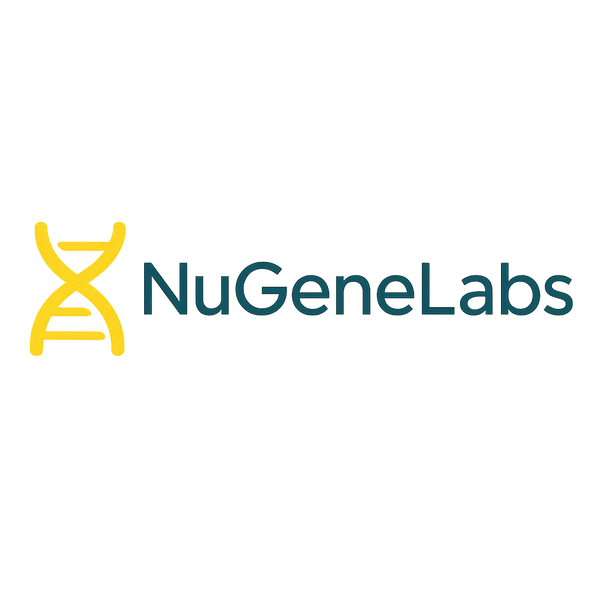Hormone Support with DHEA, Testosterone & Estrogen: Supplements for Healthy Aging
Share

Who this is for: adults noticing age‑related hormone shifts, athletes optimizing performance, and anyone curious about safe, science‑aware ways to support energy, strength, mood, and longevity.
Key Takeaways
- DHEA is a precursor that can convert into testosterone and estrogen.
- Testosterone supports strength, bone, libido, and motivation in women and men.
-
Estrogen is essential for bones, brain, heart, mood, and skin—balance matters for everyone.
- Levels typically decline with age; symptoms vary and overlap with lifestyle factors.
- Start with testing + lifestyle; use supplements to support sleep, methylation, inflammation, and nutrient gaps.
- NuGeneLabs offers at‑home health tests to personalize your plan (NAD, DNA, telomeres, metals, GI, organic acids).
- Work with a clinician before starting hormone therapy; OTC DHEA isn’t risk‑free and isn’t a universal “anti‑aging” fix.
Hormones 101 (Fast)
As we age, changes in DHEA, testosterone, and estrogen can affect energy, muscle, mood, sleep, and longevity. This quick guide explains what these hormones do, how they interact, and how to personalize your plan with testing, lifestyle, and smart supplementation.
Hormones in Plain English
DHEA
Made by your adrenal glands; helps your body make sex hormones. Levels peak in early adulthood and decline with age.
Testosterone
Key for muscle, bone density, drive, and mood in all adults. Low levels can feel like fatigue, less strength, lower libido, and low mood.
Estrogen
Critical for bone strength, heart health, cognition, and stable mood. Women see bigger shifts in peri/menopause; men still need steady, small amounts.
Why Balance Matters
Too little or too much of any one hormone can cause symptoms. Because DHEA can raise testosterone or estrogen, supervision and testing are important.
Good to know: DHEA supplements are sometimes marketed for “anti‑aging,” but some time side effects are possible. Talk to your provider, especially if you have hormone‑sensitive conditions. (MedlinePlus: DHEA‑S info)
How to Personalize Your Hormone Support
1) Test, then target
- NAD Profile & Cellular Energy Test – checks 9 NAD metabolites linked to energy, redox balance, and detox capacity.
- Genomic DNA Health Test – flags SNPs influencing methylation, detox, inflammation, and hormone pathways.
- Telomere Length & Biological Age Test – tracks cellular aging trends that interact with hormone status.
- Blood Metals Panel – screens toxic elements and key minerals that can disrupt endocrine balance.
- Organic Acid & Metabolomics Test and GI Health Test – investigate energy blocks, estrobolome balance, and inflammation.
- DUTCH Test Complete — coming soon (full sex hormones, adrenal patterns, metabolites)
2) Lock down the “hormone habits”
Sleep 7–9 hours (melatonin rhythm shapes sex‑hormone signaling). (CDC Sleep)
Train consistently (resistance + zone 2), manage stress, prioritize protein and colorful plants, and get morning light.
3) Add supportive supplements (no hormones required)
These don’t replace medical care or prescription therapy; they support foundations that influence hormones.
- Methyl B Complex – supports methylation for steroid‑hormone metabolism and detox.
- Omega‑3 High Potency – helps temper inflammation that can blunt anabolic signaling.
- Magnesium (citrate) – foundational for energy, sleep quality, and enzymatic steps tied to hormone balance.
- Melatonin Calm 3 mg or Nano Melatonin – for circadian alignment and recovery (short‑term, situational use).
- ProstaFlo – men’s prostate & urinary comfort to support quality‑of‑life while addressing lifestyle foundations.
- NAD+ Platinum® – cellular energy & repair support that often pairs well with training and sleep optimization.
- Liver Support — healthy estrogen metabolism & clearance
- Super Green Capsules — phytonutrients that aid detox and hormone balance
When Is Testosterone Therapy Appropriate?
Testosterone therapy is for clinically low levels with symptoms and requires medical supervision, labs, and monitoring—it's not a generic anti‑aging shortcut. (Endocrine Society Guideline)
FAQs
How do I know if low T is my issue?
Classic signs include low libido, fatigue, less strength, more abdominal fat, and low mood but these overlap with sleep, stress, and diet. A clinician will order morning labs and assess context. (MedlinePlus: Low T)
Is over‑the‑counter DHEA safe?
It can have side effects and isn’t a proven anti‑aging pill. Discuss with your provider, particularly if you have hormone‑sensitive conditions. (MedlinePlus on DHEA)
Do men need estrogen, too?
Yes. Although men produce much smaller amounts, estrogen is essential for healthy bones, brain function, cardiovascular protection, and mood stability. In men, estrogen is made primarily from the conversion of testosterone. Extremely low estrogen can increase fracture risk, affect cognitive performance, and impact libido. This is why balanced hormone levels, not just “more testosterone”, are important for long-term health in both men and women.
When Prescription Therapy Makes Sense
Testosterone therapy or prescription options may help when labs confirm deficiency with symptoms. These require clinical supervision and ongoing labs. DHEA OTC use should also be supervised due to mixed evidence and potential side effects.
Safety, Simplicity, Next Steps
Begin with sleep + training + whole‑food protein + colorful plants. Layer in the tests above to see what you need, then add supportive supplements accordingly. If labs confirm low T or complex endocrine issues, work with a licensed clinician for a supervised plan. (Endocrine Society: Patient Guide)
Trusted Resources
Shop At‑Home Health Tests Shop Cellular Health Supplements
NuGeneLabs.com – Your Health Tests Don't Guess. Neither Should Your Supplements.
This content is for educational purposes only and was developed by NuGeneLabs editorial team based on published research and practitioner insights. It is not intended to replace medical advice.
